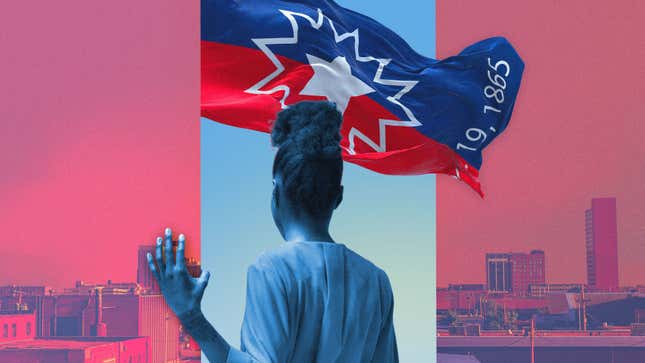Juneteenth in Lubbock, Texas, Was When Our Men Came Out of the Shadows
Women were long in charge of our family celebrations. But in 1984, a group of men stepped up to organize the community and recover the early traditions.
In Depth
Illustration: Vicky Leta
What I remember about the Juneteenth of my girlhood is the sound of music and how our parents could cha-cha all night long. I remember Mr. Stroke’s face in the light of the fire pit at night and how Uncle Robert’s brisket would shoot juice when you bit into it. I remember the shade-tree stories about some hundred plus years ago. About chains, forced labor, and withheld freedom. And I remember that when it came to Juneteenth, unlike most other days, we looked to the men. That was unusual for small town Texas in the 1980s, because our lives weren’t built that way. We lived inside a system built against seeing them at all.
For some Americans, Juneteenth is a new holiday, but I grew up in Texas, where Union soldiers sailed into Galveston in June of 1865, bringing news of freedom to formerly enslaved Texans more than two years after President Abraham Lincoln issued the Emancipation Proclamation, which established the freedom of more than 3 million enslaved people living in Confederate states. Many communities began holding Juneteenth festivals and celebrations as early as 1866. After emancipation from enslavement, my family migrated to Texas from various parts of the U.S., making homes across the state before heading west and settling in the Panhandle region.
I spent half my childhood in East Lubbock, where families celebrated the holiday together, informally, and relatives came from out of town. We celebrated in a city that hadn’t wanted us to begin with; a city that had, over time, grown fat from cattle and farming and cotton and oil and railroads, but left us, its Black citizens, broken and skinny, torn and tossed aside. A city where, in 1923, white residents drafted an ordinance to keep us contained in an area surrounded by industrial zoning and detrimental environmental conditions; a city that built a barrier to hide us. This town cared little about our freedom or the celebration of it. But even those who moved away came all the same, for our mothers and their mothers—it was the only home they knew.
Like my mother’s, my childhood was filled with transient uncles, cousins, and friends, who all treated home like a prison they’d escaped.
In We Real Cool, the late bell hooks wrote that, in America, the oppression and subjugation of the Black male figure is situated within the promoted “power” or presence of Black women by what hooks calls a “white supremacist capitalist society.” Essentially, this system sets up a false sense of power for Black women and emasculates Black men. Many people in my community were broken by this system. Some of the broken were men, and some of those men gave up. Others doubled down and worked harder to provide, which meant they were absent just as much as those that the system beat.
From her girlhood, my mother remembers her male counterparts cutting out of Lubbock altogether. Often, they left and spent time away from home, moving from town to town, city to city, state to state, in search of work and better resources and opportunities, returning occasionally to spend time with families they left behind. One of her favorite uncles was a drifter; he left in the 1960s, lived his life on the road full time, and never had a consistent address. “When we didn’t see him after ’85,” she told me. “We knew he was dead.” Like my mother’s, my childhood was filled with transient uncles, cousins, and friends, who all treated home like a prison they’d escaped.
What’s true in my family is that we know the women’s names. To hooks’s point, across the years, the women were constant. When the Juneteenth celebrations belonged to families, the women held the holiday together. The venues were their churches and their homes. Their voices, their stories were the ones we heard. Juneteenth belonged to them. The men were there too, manning the smokers or gathered in their own areas, where they drank and laughed. But because their work was for years less visible, it seemed that the men weren’t present or contributing at all.
They were.
When they weren’t at the smoker, they were out there working, yes sir-ing in the warehouses, factories, slaughterhouses, cottonfields, railroads, and all the other places we couldn’t see. By the time we saw them, they were often uniformed and tired. Some of them were diligent about their lawns and short with their words. They sat quietly in corners of rooms when they were present. Sometimes they listened and sometimes they snoozed. In hindsight, they were beat down, spent by the time they returned to us each day. They had nothing left to give us, so they became nothing to us, and that is why they have no place in our stories. This is hooks’s “white supremacist capitalist society” at work. At times, there was tension that rose from this between the men and women. I was always proud of my grandparents because they shared a bedroom and we knew so many others from their generation before them didn’t speak to each other at all.
-

-

-

-

-

-

-

-

-

-

-

-

-

-

-

-

-

-

-

-

-

-

-

-

-

-

-

-

-

-

-

-

-

-

-

-

-

-

-

-









































